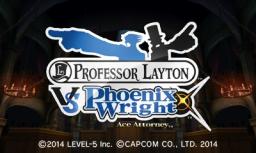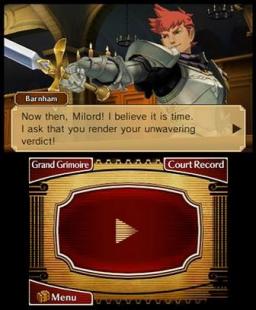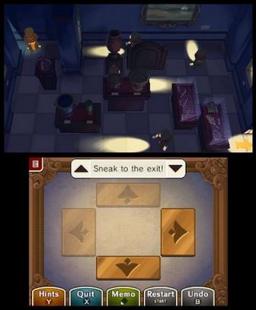Disclaimer: Review taken from my NintendoRadar account. Can provide proof, if necessary.
Professor Layton vs. Phoenix Wright: Ace Attorney is one of the best crossovers ever. There. I said it. And I shall never regret that statement. It has an ambitious plot, a wonderful setting, and great characterizations. So, so much goes right. It gives fans what they want. Great trials, great puzzles, great music (and remixed versions of the some of the most popular themes from each series, to boot). But it has incredible flaws.
Here’s a fair list:
Major plotholes, only 70 puzzles, forced to restart cases or load manual saves (something thrown out in Dual Destinies), shorter trials and, perhaps, the game is overly dark and shocking, more so than any game in either series.
But what about the good? And more on those other things.
PL vs. AA has a brilliant setting. Professor Layton is investigating a case related to one of his students when a girl comes to him seeking help. This girl soon is abducted by what appears to be a witch. She is soon rescued by the Professor and Luke, and escapes aboard a freighter. It’s not long before Phoenix Wright is sent to defend her in court for the charges of committing a crime while aboard. He wins the trial. But he and Professor Layton (along with their assistants) have been pulled into a new “Story”: That of Labyrinthia, a world seemingly composed of powerful magic and witch trials.
After being pulled into the story, Phoenix and Maya not only have amnesia, but their memories have been altered. Professor Layton and Luke remember, however. The game is a case of amnesia, arguably, “done right”. Amnesia is waaaaaaaaaaaaaaaaaaaaaaaay overused in stories, especially those in video games. It’s good to see it done well, and I won’t spoil why this is that way.
The puzzles and trials are standard quality of each franchise. And the trials introduce a new mechanic: Several witnesses take to the stand at once! This...is...awesome. It is mostly done well. But there are a few times that the mechanic is used in what can be a confusing way.
The plot is never very lighthearted. The witch trials end with witches being placed inside a metal coffin and dipped into a flaming pit. Winning a trial is presented as a wonderful thing in all of the Ace Attorney games. Not so here. It’s terrible! The characters (and you) witness supposed justice being carried out in front of your faces. Seeing the terror in the eyes of those sent into the pit can be traumatic and make you wonder if your time was worthwhile.
Not is all how it seems, however...for bad...and for good. There are abundant plot twists, including one way out there at the end. You will see why I referred to the plot as “ambitious” if you choose to play the game to its conclusion (or even, watch a playthrough).
Once the curtain is drawn back from this world and the truth is revealed many, many questions remain. And some may laugh at the conclusion. I will say that for me, it was satisfying. A bit difficult to chew, but certainly worth it.
Phoenix Wright is often presented as being many steps behind Professor Layton. He has to learn from him. Fans might be disappointed that he forgets basic lessons of courtroom procedure. But he is very much in character. Nick (yes, Phoenix) has always had a bit (or a lot) of difficulty adapting to new situations. And his situation is very much new.
Perhaps the most glaring flaw is one that may never be experienced: Game over in the final case. As truths are revealed, there comes a point in the case where game over is completely pointless. The judge is eager to find the truth, and is patient to hear it. Yet if you make minor mistakes, he will declare your client guilty. In the Ace Attorney games, this mostly, if not completely made sense, even if it was unfair. The Judge is a fickle friend. Here, it doesn’t make sense and is very much out of character for the judge.
Final thoughts:
Earns “T” rating, although family friendly. There are several shocking and possibly traumatizing moments where the player might just want to put down the game and never play it again.
A game can be hopeful and not necessarily have the most desirable outcome. The game is, perhaps, too much of a people-pleaser in some ways. And in other ways, it, perhaps, is not enough. There were many decisions made about the game that has me asking, “what were you thinking?” This game, when analyzed by fans, will likely be hated more than any other game in any of each series. If not, I would be pleasantly surprised.
Oh, and one last note: Hint coins can be used during trials. You heard me. You struggling to know where to press or present? Use a hint coin! It can make the game too easy...but some moments in trials are just so taxing that it’s just plain worth it.
Pros:
Setting is awesome
Ambitious plot that succeeds mostly; is touching.
Great characters
Remixed versions of original themes
Great Puzzles and humor
Hint coins usable during trials and are abundant
Cons:
Major plotholes
Final case pointlessly thrown out with a few mistakes
Only 70 puzzles
Forced to restart or load case upon failing (Dual Destinies reload system not usable here)
Game is arguably overly dark and shocking
Score: 8.0 |
 endings is Offline
| ID: 1350600 | 18 Words
endings is Offline
| ID: 1350600 | 18 Words
 endings is Offline
endings is Offline
 juuldude is Offline
| ID: 1350607 | 105 Words
juuldude is Offline
| ID: 1350607 | 105 Words
 juuldude is Offline
juuldude is Offline


 User Notice
User Notice 











